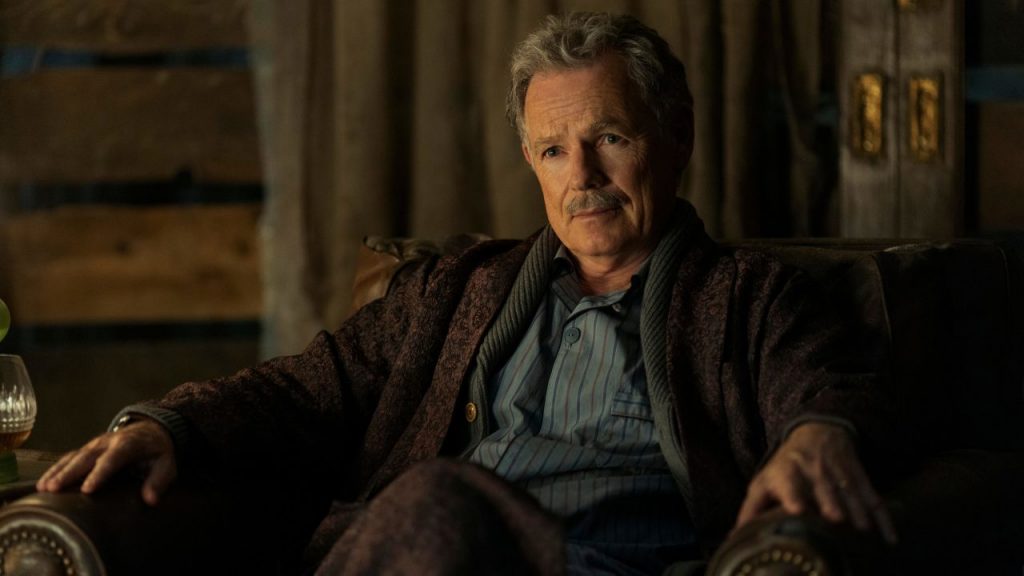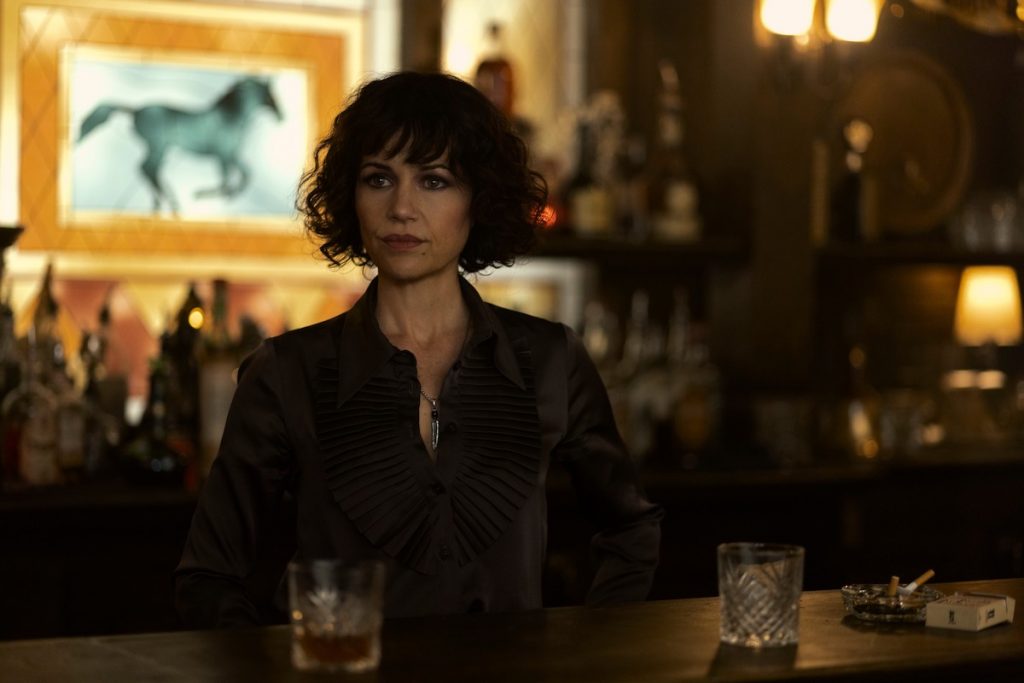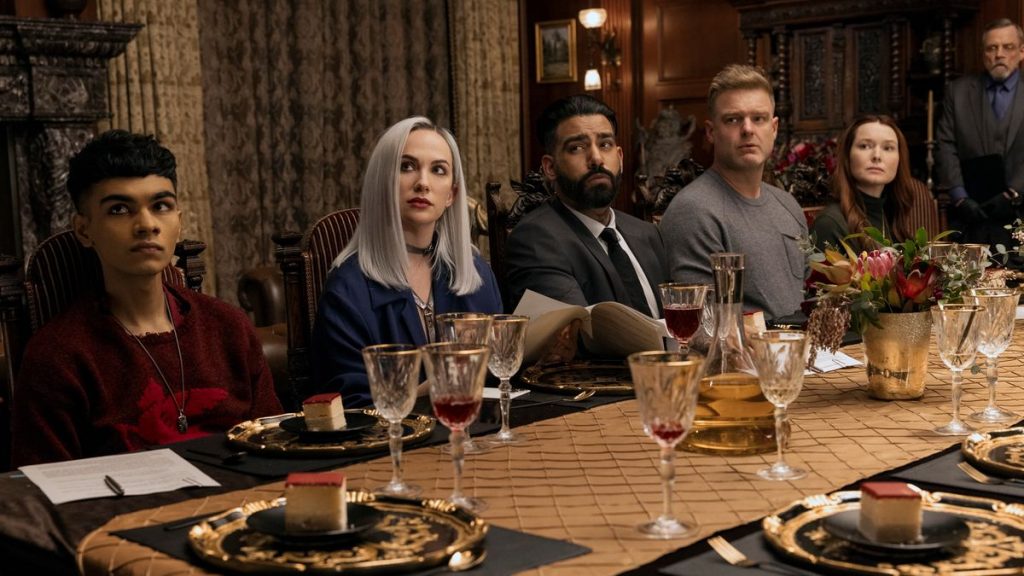The best horror and Gothic tales focus on monsters that represent humans’ own foibles and failings, how we butt against adversity and moral dilemmas and either rise above or fall short. Writer Edgar Allan Poe is considered the godfather of Gothic fiction and poetry in the United States, and it’s no secret as to why. From his works The Raven to The Tell-Tale Heart to The Masque of the Red Death and beyond, Poe’s prose and lyrical rhyme pull readers into quagmires of death, murder, and ethical quandaries, rooted in the macabre and the mundane.
One of his most notable stories that most captivatingly bounds into these territories is 1839’s The Fall of the House of Usher, focusing on the crumbling of a family and how its sins have led to that destruction. That degradation has possible supernatural origins, but Poe leaves no doubt that the Usher family itself shares the blame for its own demise.
All of this is fertile ground for a writer-director-showrunner like Mike Flanagan, who has made a well-deserved name for himself in spinning horror/morality tales with a modern twist, particularly seen in his Netflix series such as The Haunting of Hill House and The Haunting of Bly Manor. Notably, those series adapt tales from author Shirley Jackson and Henry James, respectively, with Flanagan taking liberties with those works while still retaining the original spirit and intent in adding his storytelling sensibilities.

Bruce Greenwood as Roderick Usher
Flanagan’s adaptation of the aforementioned House of Usher is now streaming on Netflix, and this version of Poe’s tale follows that same approach to similar results. Arguably, House of Usher is his best work since Hill House, and certainly his most ambitious. While taking liberties with the original story, Flanagan uses the framework of a narrator telling the tale of well-to-do family marred by the specter of death—and maybe something more sinister. However, in this modern take, the series focuses on the Usher family, headed by patriarch Roderick (played with equal parts menace and melancholy by Bruce Greenwood), and his and his sister’s (actor Mary McDonnell) control of a leading pharmaceutical company. While wildly successful, the Usher family is known to be equally ruthless and without moral scruples, shown at the start of the series as the clan is embroiled in a government lawsuit, tied to millions of deaths linked to an opioid the company manufactures.
The secret to Roderick and Madeline’s rise to power is connected to a mysterious, perhaps supernatural, woman, played by Carla Gugino, who starred in both Hill House and Bly Manor. Gugino’s performance here is as much of a powerhouse as it was in Hill House, but in a manner that truly shows audiences her full range and chameleon-like talent. That rise to power, in turn, is tied to the deaths of Roderick’s six children, including a video game mogul, a PR agent, a life fitness guru, and a hapless fail son, all also portrayed by Flanagan series veterans. To add to the mix is actor Carl Lumbly, D.A. Auguste “Auggie” Dupin, portraying a foil to the Ushers—particularly Roderick—and one who wants to knock down the family’s immoral house of cards.

Carla Gugino in Fall of the House of Usher
While this has the potential to be a convoluted tale with so many moving parts, Flanagan smartly frames House of Usher in the form of a story, told by Roderick to Auggie, recounted at Roderick and Madeline’s childhood home. The situation feels very Cold War-era, with two hardened adversaries finally sitting down, face to face, to hash out a long, bitter history. But the story is a confession, with Roderick claiming that the deaths of his children is his fault, explaining the ins and outs of his sins to an often-disbelieving Auggie. The bulk of the eight-episode season recounts a death per chapter, each with a title bearing the name of or an allusion to one of Poe’s other works, with details from those works at least tangentially tied to details of the child’s demise—and those demise are not for the faint of heart. Focusing on a child per episode, with the season bookending those episodes, helps to streamline the story, while giving the Flanagan room to sprinkle in breadcrumbs of the great mystery of House of Usher: what Madeline and Roderick did in their quest for power and why Roderick’s children were payment for those decisions.
But it wouldn’t be a Poe tale without hints of emotional gloom, and House of Usher has no shortage of those. Every scene, from the seemingly mundane to the operatic, has a patina of dread and heaviness, a caught breath filling every interaction. This is particularly seen in Juno Usher, Roderick’s second wife, portrayed by actor Ruth Codd. While at first Juno seems to be a throwaway character played for laughs—the stereotypical younger new wife whose age gap with Roderick is quite jarring—as the series progresses, we see a sadness that’s just under the surface, threatening to pour out in every moment. Her words and interactions border on pitiful and, without spoiling the series, her life is steeped in tragedy.

The Usher family hears disturbing news in Fall of the House of Usher.
Those painful scenes are married with the imagery of Gothic horror that are Poe’s—and Flanagan’s—bread and butter. Just as in Hill House and Bly Manor, Flanagan makes the various locales of House of Usher characters unto themselves, with their own parts to play. From the stark coldness of the home of Camille L’Espanaye (Flanagan mainstay Kate Siegel), Usher sibling and head of the family’s PR, to the opulent-yet-borderline-dudebro loft apartment of Leo Usher (actor Rahul Kohli), each setting speaks to the who the characters are and, ultimately, what becomes of them. In fact, almost every scene set in the present has an openness that is, ironically, claustrophobic. The most notable exception is Roderick’s childhood home, rundown from age with restrictive quarters compared to every other place we visit. However, again ironically, that setting is almost the least confined, as Roderick unlocks every Usher secret for Auggie to finally learn. Pain and avarice imprison; the truth will set you free.
While Fall of the House of Usher is certainly an enjoyable romp for fans of horror and frights, the real stars of the series are the impacts of loss, tragedy, and moral compromise. It’s a lesson that both Poe and Flanagan are more than suited to tell.
All eight episode of Fall of the House of Usher are now streaming on Netflix.
